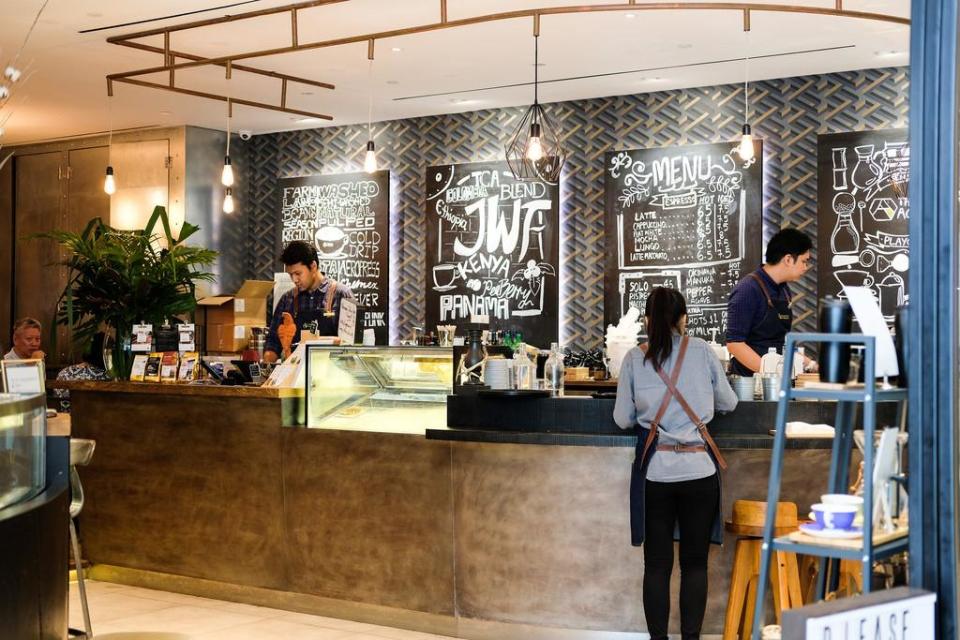An interview with Asia’s queen of coffee

While South Korea remains the hotspot for coffee drinkers in Asia, coffee entrepreneur Jennifer Liu thinks that Hong Kong and Singapore are just as exciting.
The entrepreneur and owner of coffee chain The Coffee Academics launched her first cafe in Hong Kong in 2003, the same time Asia was embroiled in the SARS outbreak. It was also the same time the bold businesswoman had lost her father, the person who had introduced her to coffee when she was just 6 years old during their weekly brunches at a neighbourhood Kopitiam.
“He didn’t get to see the development of this childhood experience of ours. I’m sure he would be quite happy with where I am right now because he never believed that as children, we ought to follow their footsteps. We should be able to embrace our own passion,” Liu, 44, told Yahoo Lifestyle Singapore during an interview on Thursday (3 August).
The Hong Kong native was in town for the Singapore Coffee Festival, happening from 4 to 6 August at the Marina Cruise Centre. Liu launched The Coffee Academics in Singapore in November 2016 with a flagship store at Scotts Square shopping mall. Her second outlet is located at Raffles City.
Since venturing into Singapore, she has noticed many differences and similarities among coffee drinkers between the two cities, from the type of coffees to the speed of brewing.
“Coffee drinkers in Hong Kong don’t really need to understand their coffee so much. They care more about having the coffees served fast,” said Liu.
While speed is also important for Singaporeans, they are more adventurous about what they drink as well, Liu explained. It’s therefore unsurprising to find out that the idea behind The Coffee Academics’ sensational “coffee in a cone” drink came from a Singaporean colleague.
“Normally, as a specialty coffee house, we are less into the trends and gimmicky kind of things. People perceive The Coffee Academics as serious, no syrups and more about the science. But we thought that we must have a fun side as well, and this coffee shows that side of us,” said Liu.
The beverage uses a waffle cone that has been coated with several layers of chocolate, making it safe for you to walk around without fear of the coffee leaking. The Coffee Academics also owns exclusive rights to this beverage concept, which means you won’t see it in any other cafes.
Another common thing about cafes in Hong Kong and Singapore, Liu has noted, is that both cities see many tourists patronising cafes. These tourists tend to come from the same countries too, such as South Korea, Japan and even Dubai.

What makes a good cup of coffee?
With so many cafes brewing across Asia including Singapore, it can get quite difficult to tell the difference between good and bad coffee. According to Liu, basic principles apply regardless of the type of coffee and who is making them for you. As long as you understand the coffee before you decide on what you like, that is.
“We always say that a good cup of coffee goes through 44 pairs of hands to get here, from the growers to farmers to roasters to your baristas,” said the architecture graduate, who has had experience in real estate prior to venturing into the coffee business.
Based on this principle, Liu ensures that her companies know her farmers, logistics companies and coffee roasters directly, and make sure the farmers are ensured minimum wage and offered marketing intelligence to improve on their agricultural businesses.
“It has also helped to minimise the middleman (in the business),” said Liu, who works with farmers across various locations, including South America, Yunnan and Banda Aceh, to ensure her cafes can offer coffee beans with a wide range of tasting notes based on the type of flavour, level of boldness and acidity, among other things.
If you prefer the Kopi served at Kopitiams, Liu explained that the coffee at these places tend to “mix Robusta and Arabica beans”. “The Robusta beans are very strong, they roast it very dark, and the beans are grown in the poorer regions,” said Liu.
In the past, Arabica beans were only brewed at places such as hotels. Today, you can find them at many places. Meanwhile, the coffees you find at specialty cafes – where you get your lattes and flat whites – are roasted more lightly as compared to the ones at Kopitiams. The taste is less strong and the beans used are grown at more affluent regions.
At the same time, lightly-roasted coffee beans also mean that the coffees are more acidic, which many Asians may mistake as having a sour taste.
“Sour is generally the notation of something going bad, but acidic is a good word, and its found in fruits like strawberries. Asians need to understand that acidity and sourness are two different things,” said Liu, adding, “Once you understand, you’ll appreciate lighter roasted beans which are healthier for the body.”
So what’s the Singaporean coffee palate? “It is slowly moving towards the light type,” said Liu.
Related stories:
Say It Ain’t So! Dunkin’ Donuts Is Considering Changing Its Iconic Name
Drinking matcha in Japan: Why the roots of this Instagram favourite run deeper than you think
Follow Yahoo Lifestyle Singapore on Facebook.


